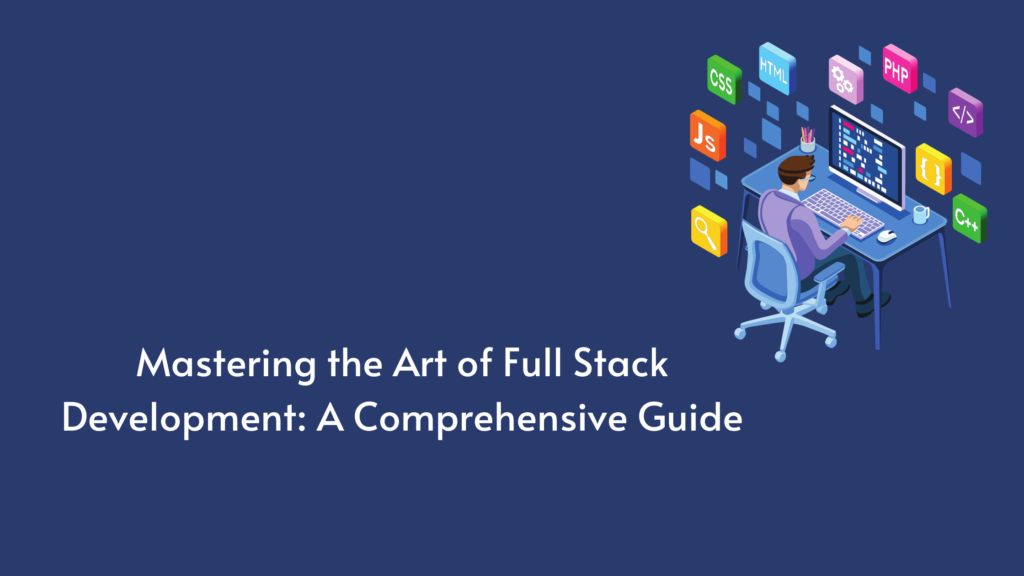Your Guide to Becoming a Full Stack Developer

Introduction: In today’s rapidly evolving tech landscape, the demand for versatile professionals who can handle both front-end and back-end development is on the rise. Full stack developers, with their ability to work on all aspects of web development, are becoming indispensable in the IT industry. In this blog, we’ll explore how to become a full stack developer, the different types of full stack developers, the importance of this role, and the promising future and growth prospects it offers.
How to Become a Full Stack Developer:
Becoming a full stack developer requires a well-rounded skill set and a commitment to continuous learning. Here are the steps to get started:
- Learn the Basics of Front-end and Back-end Development: Begin with the fundamentals of HTML, CSS, and JavaScript for front-end development. For back-end development, choose a programming language like Python, Ruby, Node.js, or Java.
- Master Front-end Technologies: Dive deeper into front-end development by learning popular frameworks and libraries like React, Angular, or Vue.js. Understanding responsive design and user experience (UX) principles is also crucial.
- Explore Back-end Development: Gain proficiency in server-side programming, databases, and server management. You can specialize in one or more back-end technologies such as Node.js, Django, Ruby on Rails, or ASP.NET.
- Database Management: Learn how to design, create, and manage databases. Familiarize yourself with both relational (e.g., MySQL, PostgreSQL) and NoSQL databases (e.g., MongoDB).
- Version Control: Use version control systems like Git to collaborate with other developers and manage code efficiently.
- APIs and Web Services: Understand how to create and consume APIs (Application Programming Interfaces) for data exchange between front-end and back-end systems.
- Deployment and Hosting: Learn about deployment techniques, cloud services (e.g., AWS, Azure, Heroku), and server management.
- DevOps and Automation: Familiarize yourself with DevOps practices, continuous integration, and automated testing to streamline development workflows.
- Soft Skills: Develop strong problem-solving, communication, and teamwork skills, as full stack developers often work in cross-functional teams.
- Build a Portfolio: Create personal projects or contribute to open-source projects to showcase your skills. A portfolio is essential when seeking full stack developer roles.
Types of Full Stack Developers:
Full stack development is a broad field, and professionals can specialize in different areas. Here are some types of full stack developers:
- MEAN/MERN Stack Developer: Specializes in MongoDB, Express.js, Angular (or React), and Node.js for building web applications.
- LAMP Stack Developer: Proficient in Linux, Apache, MySQL, and PHP/Perl/Python, typically used for server-side scripting.
- Ruby on Rails Developer: Focuses on building web applications using the Ruby on Rails framework.
- Python Full Stack Developer: Utilizes Python for both front-end and back-end development, often with frameworks like Django or Flask.
- Java Full Stack Developer: Works with Java to build enterprise-level applications and systems.
- .NET Full Stack Developer: Specializes in Microsoft’s .NET framework for web application development.
Importance of Full Stack Developers:
Full stack developers offer several advantages:
- Efficiency: They can work on both sides of a project, reducing the need for multiple developers.
- Versatility: Full stack developers can adapt to changing project requirements more easily.
- Cost-effectiveness: Hiring one full stack developer can be more cost-effective than hiring separate front-end and back-end developers.
- Faster Development: Projects can progress at a quicker pace since full stack developers can handle various tasks.
- Problem Solvers: They have a holistic view of applications and can identify and solve issues across the stack.
Future and Growth of Full Stack Developers:
The future for full stack developers looks promising:
- High Demand: As companies seek to streamline development teams and reduce costs, the demand for full stack developers is expected to grow.
- Continuous Learning: Staying updated with the latest technologies is essential for a full stack developer’s career growth.
- Specialization Opportunities: Full stack developers can choose to specialize in areas like cybersecurity, DevOps, or cloud computing.
- Entrepreneurship: Full stack developers often have the skills needed to start their tech companies or work as freelancers.
- Global Opportunities: Full stack development skills are in demand worldwide, offering opportunities for international career growth.
In conclusion, becoming a full stack developer is a rewarding journey that requires dedication, continuous learning, and adaptability. With the increasing importance of versatility in the tech industry, full stack developers are well-positioned for a successful and dynamic career.
Top of Form

Leave a Reply